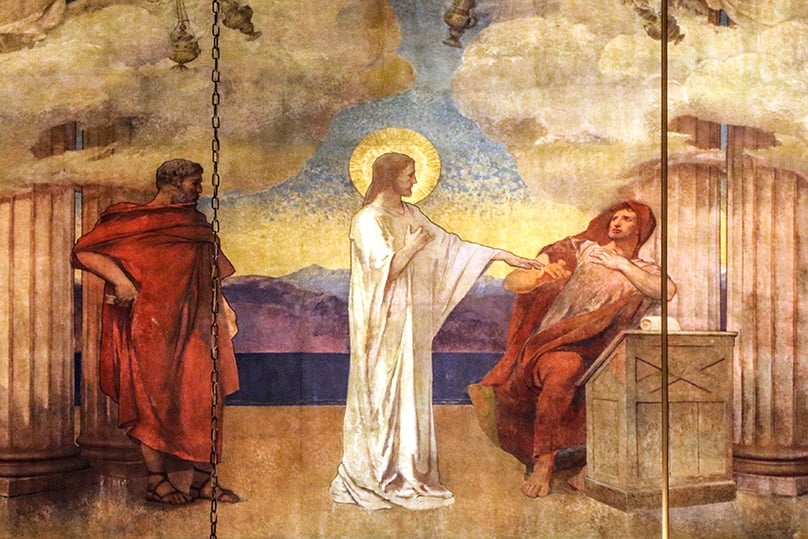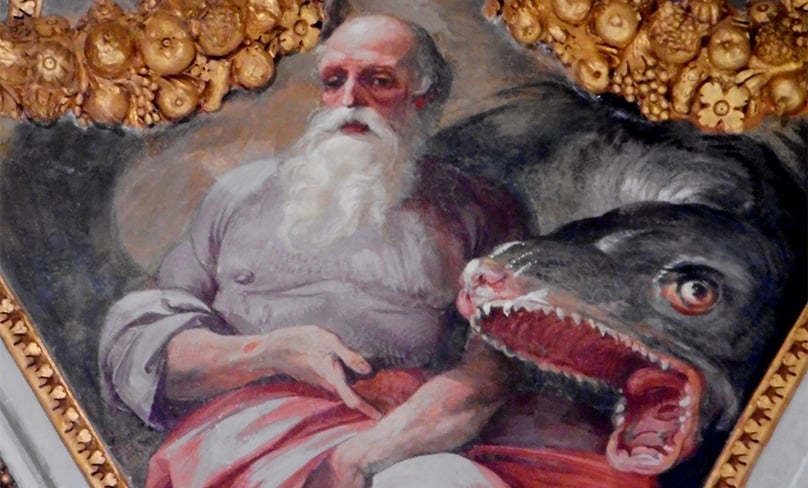
It’s the first Sunday of Advent, the year of Matthew, Year A, whose symbol is an angel or a winged man.
Matthew is a splendid saint. He’s not just an evangelist – he’s a man who got up and walked away from his well-paid job simply because Jesus invited him to.
St Matthew’s feast day is 21 September, which is also the feast day of St Jonah, one of our Old Testament saints. Jonah is famous for getting up and running away from God, so he’s like the flipside of St Matthew.
You often see images of Jonah and his nemesis, the whale. But in Christ Church Cathedral in Oxford, there’s an unusual stained-glass window of the story of Jonah.
It shows Jonah sitting under a tree, waiting for God to destroy Nineveh as Jonah had prophesied. Nineveh is sitting there as well, looking back at Jonah, and nothing is happening.
That’s because Nineveh repented, and God decided not to destroy the city after all (Jonah 3). But Jonah was furious, because he’d been looking forward to seeing justice done.
“Jesus had a soft spot for Jonah as well, which Matthew shares with us (Matt 12). He’s the only Old Testament prophet Jesus mentions by name.”
Every good Christian has sometimes felt a bit elder-brother-ish, as in the parable of the Prodigal Son. We’d really like to see evil corrected – but we go too far, because we want it done our way, and not God’s way.
St Matthew is the flipside of St Jonah. Matthew realised he was a sinner and repented. He threw a party for Jesus, at which Jesus said, “But go and learn what this means: ‘I desire mercy, not sacrifice.’ For I have not come to call the righteous, but sinners.” (Matt 9:12-13).
If you are the sort of person who’s a bit too interested in prophecies of imminent punishment for the world and the Church, St Matthew has a message for you right there.
Jesus had a soft spot for Jonah as well, which Matthew shares with us (Matt 12). He’s the only Old Testament prophet Jesus mentions by name.
Jonah’s time in the whale foretold Jesus’ time in the tomb. But the repentance of Nineveh looks forward to the Last Judgement – because they repented, and we haven’t.
Matthew also gives us a genealogy of Jesus with four remarkable women. We begin with Tamar, who obeyed the religious law to bear children for her dead husband by tricking her unjust father-in-law (Genesis 38).

Then there’s Rahab the prostitute, who may not have been Boaz’s actual mother, but one of his more distant ancestors.
Ruth was a foreign woman who chose to obey the Israelite law of arranged marriage out of love for her mother-in-law. She married Boaz and was King David’s great-grandmother.
And finally, there’s Bathsheba – the only woman not mentioned by name. Bathsheba was taken unlawfully from her husband by the very same King David, and became the mother of Solomon, a wise but deeply flawed king.
Matthew makes it clear from the first chapter of his Gospel that Jesus is completely human and has human ancestry. They say you can’t choose your ancestors, but Jesus did, and they’re an interesting crew.
What message does this coming Year of Matthew have for us? Matthew’s gospel is above all about Jesus as the Jewish Messiah – the anointed one, the Christos.
Because most of us aren’t of Jewish extraction, we don’t fully appreciate this promised fulfilment. It was a long, long promise that must have looked very threadbare at times.
“We can learn from Matthew’s gospel that Jesus did not delay a millisecond in coming down from Heaven.”
And yet there He was, at exactly the right time and place in history. We sometimes use the refrain from Habbakuk 2 in the Advent liturgy: ‘If it seems slow, wait for it – it will surely come, it will not delay.’
We can learn from Matthew’s gospel that Jesus did not delay a millisecond in coming down from Heaven – that He came to us as early as He possibly could. A year earlier would have been too early; a year later, too late.
On a more personal note, this year’s annual Advent shame-cleaning (Schamreinigung) of my house is tinged with some sadness, because it’s our first Christmas as orphans. My sister and I hosted our parents for Christmas lunch for the last 11 years.
We used to always say, ‘Come over to our place unless you get a better offer’. In the last 12 months they both got a much better offer and are spending Christmas with God (we hope).
So we’re cleaning our house for our own benefit, rather than shame-cleaning because other people will see our mess. This is an Advent reflection all by itself.
Happy New Year!
